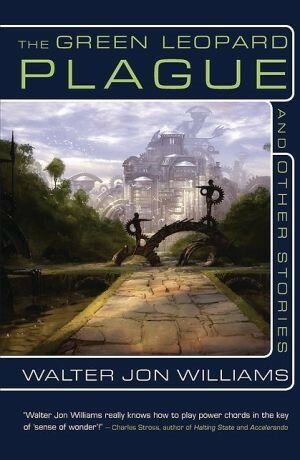“The Green Leopard Plague and Other Stories” by Walter Jon Williams encapsulate his expectations for a post-scarcity, post-Singularity world. These are worlds where you can upload your mind to a permanent virtual reality or raise children in them to be downloaded later. Nearly every one consists of worlds where nano-beds can scan your body, your mind and maybe even your soul to be downloaded into the body of your choice. Whether a gorilla body on Earth or adapted body on an alien colony world is up to you. Each story asks a different question while seeking to answer it.
“Daddy’s World” is one a story I’ve read elsewhere, because it reflects so many people’s desires. What if you could scan the mind of the dying, grow a new body, and download the dead person? It lets you “save” them. In this story, they can’t download the mind so the child grows up in a virtual world. And everyone else is living in the real one. What happens to those living with the literal ghost of a dead child?
“The Green Leopard Plague” is the story for which this collection is named. It is the best work I’ve seen in explaining how economics and taxes would work in a post-scarcity world. How do you make people pay taxes and do dirty work when they don’t have to work to eat? And the narrative lacing around the academic discussions is a quest to end world hunger by genetic engineering, the namesake plague, and a failed youthful romance in the post-singularity future.
“Lethe” is set in the same world as “The Green Leopard Plague”. If you can download your mind into a new body, while not do it more than once? Why not create multiples of yourself? And when you can download into a 20 year old version of yourself, a simian body or body adapted to an alien world … why not alter yourself to make yourself happy with the world? But what does this do to your soul?
“Last Ride of German Freddie” can best be described as Nietzsche in the Wild West. He falls in love with an American Jewess and a metaphysical problem. Walter Jon William’s detailed explanations that serve well when explaining advance terraforming and technology weigh down this short story. I’ll say it is not as bad as Kim Stanley Robinson’s books that feel like a geology text book with bits and pieces of short story woven throughout.
“Millennium Party” is a very short story of two virtual post-humans celebrating their thousand wedding anniversary. How would such people live their lives, such as they are?
“Tan Dynasty Underwater Pyramid” stands out for its uniqueness. How do you hide an underwater salvaging and smuggling operation? By posing as a performing troupe that can really perform, of course. Interesting story, great concepts, but weighed down again by the massive amount of detail.
“Incarnation Day” shows an interplanetary human society that raises children virtually before downloading them into engineered bodies. It shows what this childhood is like from a near adult eagerly awaiting her incarnation day. They’re desperate for it, too, because they don’t get their full human rights until that point. Offend your parents or just go on the fritz (pun intended, you’ll get it if you read it), and you can be deleted. One girl is rebelling against her strict mother, and her best friend is trying to save her. What would society be like if many parents created virtual children they had complete control of before turning them loose on the universe?
“Send Them Flowers” is in its own universe in every possible way. It feels like an interstellar pirate story plus corporate politics gone amok crammed into one. There’s too much time spent on how cloned genetically engineered corporate families run everything and convoluted scams and not enough in said universe. It barely answers the question, “How would two free spirits with a spaceship live on the edge of society?”
“Pinocchio” is a youthful love story and competition between celebrities among humans and post-humans. What struck me most was how it predicted the rise of YouTube influencers, celebrities for the sake of celebrity, and the terrible emotional toll this causes on the person. How can you deal with addiction to attention and constant connections to the data feed when it is destroying you? His only mistake here was assuming social media influencers funding a lavish lifestyle were a century away, not a generation away from when the book was written.



Comments
Leave a Reply